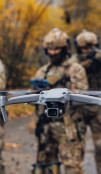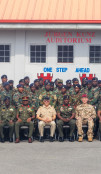Connecting Media Communities – study trip to Ukraine and Poland for journalists

The group consisting of journalists from the Middle East, Northern Africa, Western Balkans and Asia joined a 5-day long visit to gather first-hand experience in Ukraine documenting Russia’s war of aggression, meet with the survivors, and visit the places of crimes of aggression and remembrance. The visit was also an occasion for the media to engage in discussions with Polish and Ukrainian journalists and fact-checking community and gathering reporting material of the stories of communities impacted by the war and their resilience. “I want to tell the people of Kazakhstan the truth about this war because we still have Russian television and, unfortunately, many Kazakhs still believe the propaganda”, emphasized one journalist who joined the event.
The visit started in Warsaw, where the group attended a series of workshops and meetings with Polish journalists reporting in Ukraine, volunteers and civil society representatives. They learned the stories of those who helped the Ukrainian citizens finding refuge in Poland and engage in support actions from the very beginning of the full-scale invasion. The group also participated in a training on dealing with trauma in war reporting and ethical journalism. The visit in Poland was organized by MIXER, a Polish media organization.
In Ukraine, the Deputy Head of Delegation of EU to Ukraine, Mr. Rémi Duflot, greeted the journalists.
“Russian war propaganda is trying to undermine the EU-Ukraine cooperation. We know this very well.” – he said in his opening remarks.
“In Ukraine, we work with our partners in the Government of Ukraine and across civil society to dispel myths and misconceptions about European Union-Ukraine relations and cooperation. The role of media and civil society is crucial in this work.”
Apart from joining forces with civil society and media organizations, Duflot referred to the strong, high-quality local journalism, fact-checking, media literacy, pre-bunking and awareness raising to disinformation, and the use of humour as effective anti-dotes to disinformation.
His recommendations were echoed in the panel that followed with the leading Ukrainian fact-checking organizations, including TEXTY, Detektor media, Vox Ukraine, NDI, Ukraine World, and the Center for Strategic Communications. The latter shared their experience on how they counter Russian information manipulation and disinformation with tools such as the "Propaganda Diary" - a database of Russian propaganda themes and their debunking, as well as the The Lobbying Atlas – an analysis of individuals and entities involved in spreading pro-Kremlin messages in Europe, and Putin’s Paranoia – an analysis of over 10,000 speeches by the Russian president
The journalists also learned of The Book of Memory, a collection of stories of eyewitnesses and victims of Russian crimes that occurred in Ukraine during the full-scale Russian invasion. It covers a range of topics such as the deportation of Ukrainians, the killing of civilians, the detention and torture of prisoners and military servicemen, the discovery of mass graves in regions that were liberated from Russian occupation, kidnappings, the shelling of buildings and infrastructure and massive Russian missile strikes. The project is run by Internews Ukraine and NDI.
“We are also victims of Russia’s war crimes in Syria, for which we feel and understand Ukrainian’s suffering”, said one of the participants from Syria.
The next day, the journalists went on two field visits to Gostomel, Bucha, and Irpin, along with Yagidne, Lukashchivka, and Chernihiv, where they visited the scenes of war crimes perpetrated by Russia and talked to survivors, volunteers and journalists documenting the suffering of local people.
On the return from the site visits, the delegation joined a panel discussion on war reporting with leading Ukrainian investigative journalists, including Oleksandra Romantsova, the Executive Director of Center for Civil Liberties, 2022 Peace Nobel Prize winner and co-founder of the Tribunal For Putin Initiative, Anna Myroniuk of The Kyiv Independent, Slidstvo.info, Kharkiv Human Rights Protection Group and members of the Bucha Memorial Project that documents killings of civilians in Bucha.
The final day of the study visit offered an opportunity for in-depth reporting on topics of interests flagged by the journalists, such as the forced deportation of children, the impact of war on society, in particular on women and children, resilience and reforms despite the war, and internal solidarity movements.
The visit in Ukraine was supported by the EU Delegation to Ukraine, Lviv Media Forum and Ukraine Media Center. It was organized as part of a series of capacity building events for media communities entitled “Connecting Media Communities in the Age of Disinformation”





